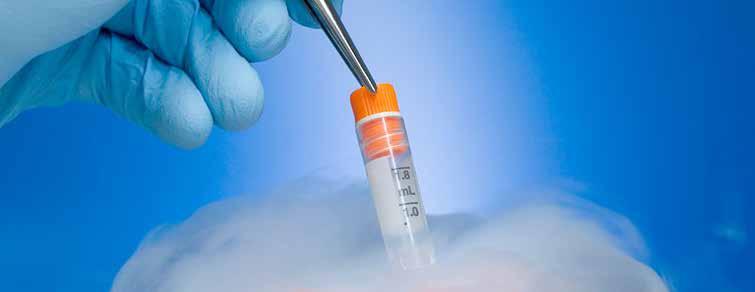
3 minute read
Dr Andrew Cary Freeze for the future
Freeze for the future
IF YOU’RE NOT READY TO GET PREGNANT, BUT DON’T WANT TO MISS OUT ON BEING A PARENT, EGG FREEZING MAY BE THE SOLUTION FOR YOU. EGG FREEZING ALLOWS YOU TO STORE YOUR UNFERTILISED EGGS, TO PRESERVE THEIR QUALITY FOR USE IN THE FUTURE.
Advertisement
Frozen eggs may be stored for many years. When you are ready to use your eggs, they are thawed, and then fertilised with sperm – either from your partner or a donor. A healthy fertilised egg can develop into an embryo, which will then be transferred back to your uterus, with a subsequent chance of pregnancy.
Egg freezing can benefit women who may not be ready to get pregnant yet, but are concerned about the effect of ageing on their fertility. Age-related infertility in women is one of the most common issues presented to Fertility Specialists each day when trying to help patients become pregnant. A woman’s most fertile years are in her 20s and early 30s, when the ovaries still contain a large number of healthy eggs. For the 10 to 15 years prior to menopause the ovarian function deteriorates, meaning women in their 40s have a much lower chance of producing a healthy pregnancy using their own eggs.
By freezing eggs, you can preserve your fertility until you are ready to get pregnant. For example, a 40-year-old woman trying to get pregnant using eggs she froze at 30 years old, will have approximately the same chance of pregnancy as a 30 year old.
Hormonal stimulation
To obtain eggs for freezing, you will usually undergo hormonal stimulation over 10–12 days enabling a group of eggs (usually 10–15) to mature. There are a variety of stimulation techniques for this, and your Fertility Specialist will work with you to develop the best treatment for your individual circumstances. The stimulation typically involves daily injections of hormones using a tiny needle under the skin, which are very easy to administer. You will be given instructions on administering the medication in an introductory session with our fertility nurses.
During this time, you will also need regular blood tests and ultrasound scans to monitor hormone levels and egg development.
Egg collection
The eggs are removed from the ovaries using an ultrasound guided probe. Attached to the ultrasound probe is a fine needle that passes through the vaginal wall into the ovary and draws the fluid (and egg) from the ovary. You can go home about one hour after the procedure and are advised to rest quietly for the rest of the day.
Egg freezing procedure
The eggs undergo freezing, or cryopreservation, in the IVF laboratory, using the latest scientific technology. This process involves immersing each egg in a series of special fluid solutions to protect its cellular structure, followed by storage in freezing tanks of liquid nitrogen. Eggs may be stored for many years.
A stimulated cycle would result in the collection of 10 to 15 eggs. Approximately 70 to 80 percent of eggs would survive thawing, approximately 40 to 50 percent of surviving eggs would fertilise and approximately 79 to 90 percent of fertilised eggs would develop into good quality embryos, depending on the age of the woman and her inherent egg quality, and the quality of the sperm. A single embryo would have a 25 to 35 percent chance of developing into a pregnancy.
The younger the woman is when her eggs are frozen, the better the chance of the thawed eggs resulting in a pregnancy. Egg freezing in women over the age of 37 or 38 would be expected to have a lower chance of pregnancy.
Egg freezing costs vary depending on your individual circumstances. If there are medical reasons for freezing eggs, Medicare will provide a rebate on the associated costs. Once eggs are frozen, ongoing storage fees will also apply every 6 months.
Dr Andrew Cary has 28 years’ experience in assisting women with pregnancy, gynaecology and IVF issues. Get in touch for further information or to book an appointment.
DR ANDREW CARY MBBS (QLD)
Get in touch for further information or to book an appointment.
Tel: 07 5597 3770 qfg.com.au and drcary.com.au










